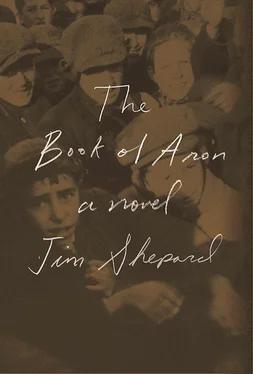A pack of kids ran by us and almost knocked him down. He half-sat against a post. His breathing sounded like my mother’s and I thought I would have to run away and leave him on the street if he kept making those sounds. He said to himself that the smugglers lived a little longer and the unenterprising died in silence.
Then he didn’t speak again until we turned onto Sienna and could see the orphanage. I thought if he died on the street, where would I be then? He took my hand to stop me and looked at where we were going like the building itself could kill him.
Jerzyk and some other boy were playing in the street with some rope, taking turns whipping each other. We could hear their laughter. “You know what I dream of?” Korczak said. “A room in Jerusalem with a table and something to write on. Transparent walls so I wouldn’t miss a single sunrise or sunset. And I’m just the silent Jew from who knows where.”
We stood where he’d stopped us. He held the lamppost to keep himself steady. Then he made an after-you gesture with a bow and cleared his throat behind me all the way down the block.
“DID YOU THINK YOU WERE GOING TO HIDE IN THAT orphanage until the war was over?” Lejkin asked. I hadn’t realized he was behind me on the street. I’d been sent out with Zygmuś and a handcart to pick up a barrel of pickles someone had told Korczak he’d donate.
“Let’s have a talk,” Lejkin said. “Your friend can handle the stolen goods.”
I stopped and Zygmuś kept pulling. He rattled the cart over the trolley tracks and around the corner and out of sight.
“They’re not stolen,” I said.
“Our friend Obersturmführer Witossek thought I should remind you that you’re still a member of the anti-crime unit,” Lejkin said. “It’s not as though our problems have gone away while you’ve been settling in at your new home.”
I shoved him as hard as I could. “You said they weren’t hunting smugglers,” I said.
He straightened his collar and stuck out his chin. “The Germans do what the Germans do,” he said. “What you want to remember is how to keep them from doing it to you.”
He said I should let him buy me a hot chocolate and pulled me to a café down the street.
The café was full and warm enough from its stove that its windows ran with condensation. Outside of it a boy sat cross-legged with a baby next to him on a spread handkerchief, the baby on its side and panting like a pigeon. Inside we sat there looking at each other and he handed me a napkin for my eyes. “You cry more than any other person I know,” he said. A woman approached our table and he said, “Watch: this one carries a photograph of herself from happier days to show what a wreck she’s become.”
When the waiter came he ordered for me. He asked if I’d heard about Lübeck and when I said no he told me, after making certain no Germans were near, that the British had bombed it flat. When I didn’t say anything he said that everyone in the Order Service, optimists and pessimists alike, believed Germany would lose in the end, but the pessimists claimed that before that happened Germany would gain control of the world. The optimists said Germany had waged total war in Poland, lightning war in France, an installment war in England, and a fatal war in Russia. He said people had started writing 1812, the year of Napoleon’s defeat, on the walls.
He said he’d asked Witossek when he thought the war would end and Witossek had answered when Germans were eating once a day and Jews once a month.
When the hot chocolates arrived he toasted to good fortune and when I asked what good fortune he said he was moving up in the Order Service and was now Szeryński’s deputy. So you could say he was second in command of the entire yellow police.
He was just making conversation, he said finally, when I still hadn’t answered.
I told him I needed to get back.
He said they would like me to tour certain areas with them in case I might have some hard-won knowledge that would come in handy.
“You want me to help you kill someone else?” I said.
He asked if I wanted my hot chocolate and when I didn’t answer he drank it. “The requisitioning is about to get more extreme,” he said. “No potatoes. No bread. No coal for the orphanages but plenty for the coffeehouses.”
What could any of us do, I told him. None of us had any luck.
“Think of it like this,” he said. “Are we to dole out spoonfuls to everyone, with the result that no one will survive? Or give a fuller measure to the few?”
“I need to get back,” I said.
“I’m going to talk to you as though you can understand,” he said. “Shyster to shyster, as it were. Those with no talent for swindling always suffer.” He gestured outside. “You and I both know that no compassion can be expected from the Germans. Whether we live or die depends on how long they’re in power. If they have enough time, they’ll kill us all. If not, some can be saved.”
I stood up and he didn’t try to stop me. “We won’t need you until the end of the week,” he said.
“Why do you need me ?” I said. “Why can’t you get someone else?”
He ran his finger around the inside of my cup. “It’ll help to think about others the way my boss Szeryński does,” he said, then stood up himself and made an after-you gesture like Korczak’s. “He says that refugees are like autumn leaves.”
He followed me out onto the sidewalk. It had begun to snow and he pulled up his collar and then pulled up mine. Then he cleaned off his seat and got on his bicycle and rode away. Because of the snow it slipped and slid all over on the cobblestones and he had to put his foot out every so often for balance.
THE OTHER STAFF MEMBERS SLEPT IN A BUILDING next door but Korczak had his office and bed on the floor above us in what everyone called the isolation ward for the kids who were the sickest. His bed and night table were in the middle of the room with the kids’ beds arranged around them. Each bed had a pail next to it on the floor and all the kids had compresses on their heads. Korczak looked to be asleep, even though his lamp was lit and his clothes were still on. The kids were asleep. It was after four in the morning.
There was a heel of black bread on the table and another piece in his hand, as if he’d fallen asleep eating.
I had crept up the stairs to talk to him. I heard a noise and hid behind his desk and then Madame Stefa appeared in the doorway and watched him sleep before moving over to the side of his bed.
“I always try to nap for an hour before the beehive starts to buzz,” he told her, and I realized he was awake though his eyes were still closed. “When I was a child, I pretended to be asleep and then opened my eyes suddenly so I could see my guardian angel before he could hide.”
She lowered herself to sit on the edge of one of the kids’ beds. She looked as tired as he did. “How was your day today?” she asked. “We didn’t get a chance to talk.” And I could hear in her voice what I’d heard in my mother’s when she’d asked me for news.
“Ten hours and seven calls,” he said. “Fifty złotys and another promise of five a month.”
She said no one expected him to spend ten hours tramping around in the cold and that his ailments were not going to allow it.
“Which ailments are those?” he asked. He was still on his back but his hand was now over his eyes.
“Your weakened heart muscle. Your pleurisy from pneumonia. Your bladder trouble. Your swollen legs and feet,” she said. “Your hernia.”
They were quiet. “It’s not funny,” she said.
“How did the doctor who refused to perform the hernia operation put it?” he asked. “My health is in ruins.”
Читать дальше












